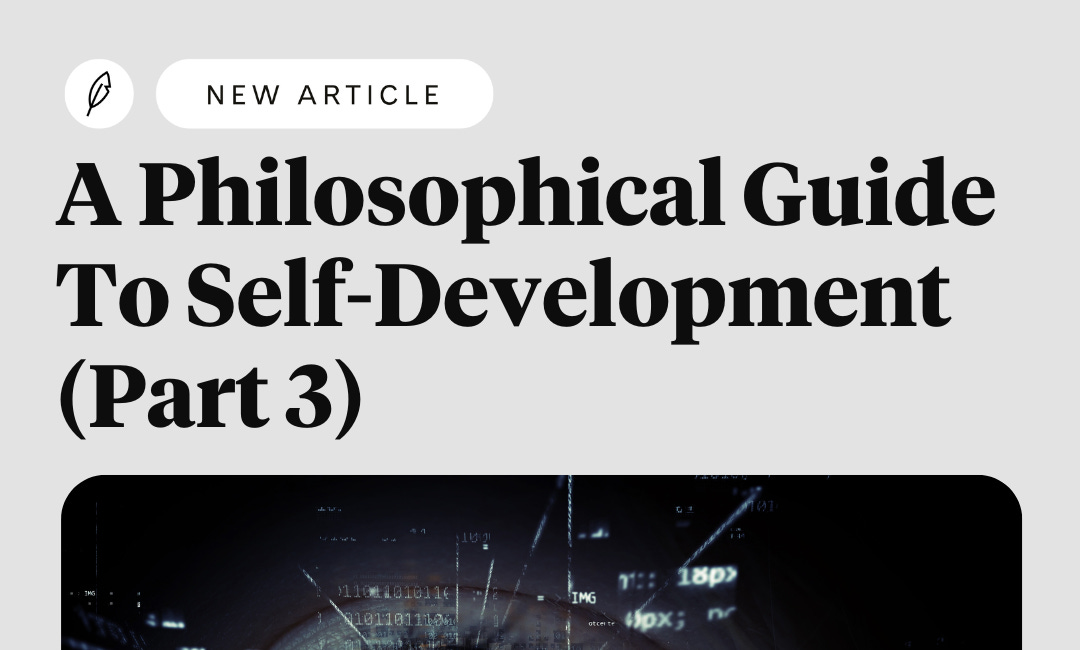In the previous article, we discussed how the loss of wisdom and spiritual traditions that organised our attention and experience, created the conditions for an attentional crisis. We delved into the function of attention, and found a profound need for developmental guidance, some trade-offs between what we find salient and what we should find salient, and essentially the perennial problems of ignorance, self-deception and self-destruction, and that somehow the answer to this problem lay in this thing called ‘character’, and how we can cultivate it?
If the root cause of this attentional problem is the loss of wisdom and spiritual traditions that can offer us the cognitive and perceptual tools to manage our attention properly, then how do we get back into a tradition? The Scientific worldview has made organised religion fairly hard to swallow and more and more young people are identifying as NONEs (no religions) with only some sort of vague ‘spirituality’. However, we still need value systems to organise our attention and our actions and this is why we can see the recent resurgence of virtue traditions like Stoicism and Buddhism in the West today to fill that void.
What is Virtue Ethics?
“Ethos Anthropos Daimon”
(character is fate)
Heraclitus
Virtue Ethics began in the West with Socrates, Plato and Aristotle and in the East with Mencius and Confucious (Other Eastern traditions like Buddhism, Bushido and even Ninjitsu are also virtue traditions). Virtue traditions are quasi-religions, they have some religious pre-suppositions but often exist in a much less formalised, institutionalised and rule-based ethic (deontological) way.
Virtue Ethics, and Virtue Traditions, can offer wisdom and spiritual traditions to help us cultivate our character (that line up with the function of attention very well - so well, you might even say, as some thinkers do, that virtue ethics is the proper frame of reference for dealing with the ethics of attention).
Virtue ethics is generally concerned with:
“Virtues and vices, motives and moral character, moral education, moral wisdom or discernment, friendship and family relationships, a deep concept of happiness, the role of the emotions in our moral life and the fundamentally important questions of what sorts of persons we should be and how we should live?”
Virtue Ethics places Character at the centre of our moral and ethical considerations, in contrast to other ethical theories like Deontology, which places rules, or Consequentialism, which focuses on consequences. These theories aren’t separate from one another and both consequences and rules play a role in virtue ethics, however, not a foundational role.
Shannon Vallor, Philosopher of Technology and author of ‘Technology and The Virtues’ writes, a virtue ethic has the following characteristics:
“A conception of the ‘highest human good’”
“A conception of moral virtues as cultivated states of character, manifested by exemplary persons”
“A conception of the practical path of moral self-cultivation”
“A conception of what human beings are generally like“
Basically all of the things we need, but no longer have in the West! Despite this overlap, each Virtue tradition is unique and encourages different virtues (which is a bit of a problem that we will look at later). For example, Aristotle (2013b) (§§ 1220b-1221a) identifies fourteen virtues: mildness, courage, shame, temperance, righteous indignation, justice, liberality, truth, friendliness, dignity, endurance, magnanimity, magnificence, prudence. These all sound wonderful, but in other Virtue traditions, like Homeric Virtue Ethics, some of these virtues would even be considered vices! What are the origins of these differences?
Some current research argues the core virtues identified across virtue traditions are Wisdom, Courage, Justice, Temperance, Humanity and Transcendence, and generally, a virtue is a positive disposition of character, embodied in good habits and practises, and the opposite pole vice, bad character trait, embodied in bad habits. These two poles form together to make our character, a particular pattern of being that can be defined as who we are from the outside, or internally, as a set of constraints that regulate our growth and development. So when we are talking about improving character, really we are talking about cultivating virtue and cutting down on vices.
Common Practises of Virtue Traditions.
Although Virtue traditions can’t agree on the virtues, Shannon Vallor’s book ‘Technology and Virtues’ claims to have abstracted out from three main virtue traditions (Aristotelian, Confucian and Buddhist ethics) these seven practises for what she calls ‘Moral Self-cultivation’ which is pretty much, the self-development we are discussing (descriptions taken from https://we.riseup.net/sotfe/shannon-vallor-s-technomoral-virtues):
“Moral Habituation”
“A gradual transition from an uncultivated state to a morally habituated one. One is typically motivated and guided by moral exemplars in the community. One is affected by the repeated moral practice of right (or nearly right) conduct that strikes the appropriate mean relative to the circumstances. A practice that gradually accustoms the individual to actions which were previously seen as painful or unattractive. This eventually leads to greater comfort, ease, pleasure, and even joy in performing moral action, enabling the cultivation of the virtue of temperate self-control or discipline; Which in turn enables and strengthens the ongoing commitment to moral self-cultivation required for more specific moral habits to be developed and integrated. The full development and integration of which constitute the achievement of, or increasing approximation to, a genuinely virtuous character — that is, a cultivated state of moral excellence that promotes a life of flourishing with others.”
2. “Relational Understanding”
“Ethical decisions take place in the context of specific human relationships and from the perspective of particular human roles. Virtue ethics is sceptical of “an impartial observer” or “the veil of ignorance” or other such thought experiments of other ethical systems. To behave ethically, you have to be attentive to these relationships and roles and to how they interact.” (socially)
3. “Reflective Self-Examination”
“Know thyself. You can best improve if you know your particular weaknesses (otherwise you have to rely on less-useful general-purpose advice). Regularly reflect on your specific daily behaviour and examine it in the light of your ideals/aspirations. Correct your faults and take pride in your improvement.”
4. “Intentional Self-Direction of Moral Development”
“This is an important stage in moral development in which you take responsibility for your character and identify the virtuous life as what you personally, and sincerely aspire to. Maslow’s hierarchy comes into play here, as this is harder to do unless you have some basic needs met first. Getting to this stage makes the process go a lot easier, as you realize being virtuous is what you want to do and what you value.”
5. “Perceptual Attention to Moral Salience”
“Be attentive to the salient facts of the situation you’re in that potentially call for or shape virtuous action. Understand the truth about those facts and also why they are morally salient. Unfortunately. Vallor, “the question of how to develop this sort of attention and insight is “undertheorized in classical virtue ethics”” (however this is what we did in the previous article here.)
6. “Prudential Judgment”
“[T]he cultivated ability to deliberate and choose well, in particular situations, among the most appropriate and effective means available for achieving a noble or good end.”
This is what Aristotle calls Phronesis or Practical wisdom. It is the difference between the nice child who is naturally virtuous and the virtuously morally mature adult. The child might do alright in some circumstances but in novel situations, they don’t have enough of a conscious grasp of their principles to consciously extend and even to modify their behaviour appropriately, in keeping with the spirit of virtue. The main features of Phronesis are to identify morally salient features, identify relevant consequences and to value properly in new circumstances.
7. “Appropriate Extension of Moral Concern”
“Especially in our new global, technologically-connected context, it takes a lot of deliberate attention to know how to appropriately extend moral concern “appropriately — that is, to the right beings, at the right time, to the right degree, and in the right manner.” Vallor says this is “the most challenging to cultivate” but mentions the “exchanging self and others” meditations in Mahayana Buddhism as one example.”
The Stumbling Block For Virtue Ethics.
These practices are deeply valuable and we will in a later lesson, spend time looking at each one and how we can implement them in routine as spiritual exercises. However, there is still a core problem here and one that can’t be simply stepped over if we want to really take this inquiry seriously.
As mentioned in the beginning, the virtue traditions can’t agree on what virtues are most important? And hence, they can’t agree on what character is most important to have? Therefore we don’t really have a target or end to aim at unless we take a leap of faith and just subscribe to one or other of the traditions? And that turns out to be a pretty big problem.
Alastair Mcintyre, in his Short History of Ethics, points out that Homeric Virtues and Aristetilian virtues, despite being in the same place (Ancient Greece) with only a couple of hundred years between them, recommend completely different virtues? Mcintyre points out that they do this because the culture of Homer and the culture of Aristotle had different ideals. Homer’s era valued a warrior-king while Aristotle's aimed at a contemplating rational philosopher and so this brought about some difficulties because it seems, that the ideal of virtue ethics is historically contingent and hence, culturally & historically relative. The charge of relativism is a dire one, particularly in a modern and secular age, enough to potentially render virtue ethics are arbitrary matter of choice, whichever character you like best is best? What is a normative standard we could use to evaluate which character is best? Is this even possible?
You will notice, that I haven’t tried to define the virtues, or even recommend any in particular to you, which is what Vallor tries to do in her book, which I think is a mistake. The virtues are not disembodied abstract ideals that we can just write down and teach to people, understanding them is the end of a process, and to encourage people to engage in that process, we need a clear-cut goal to aspire toward; in other words, we need to clarify the end of our moral endeavour (if there even is one), the North star of the process of self-development, and that is what we will discuss in the next article.
















Essay: A Philosophical Guide To Self-Development (part 2)